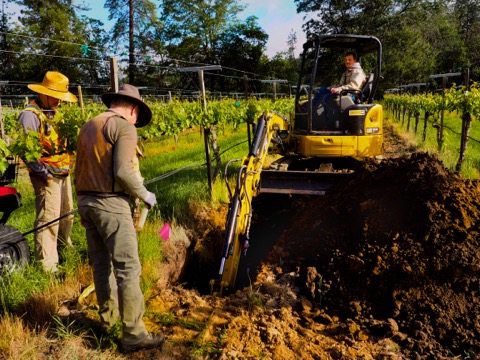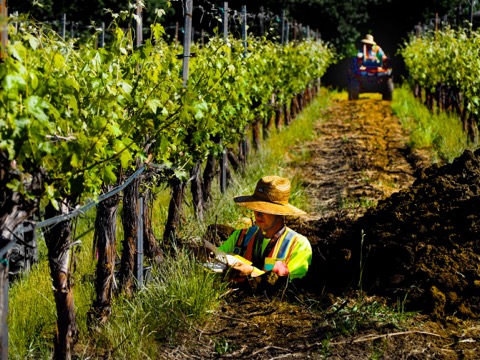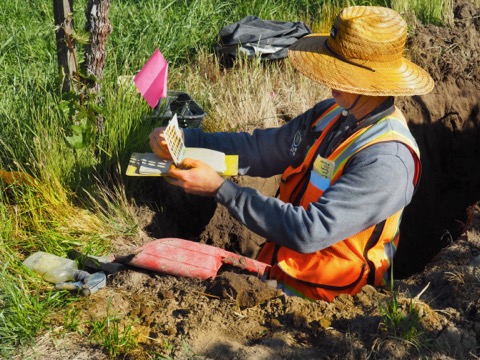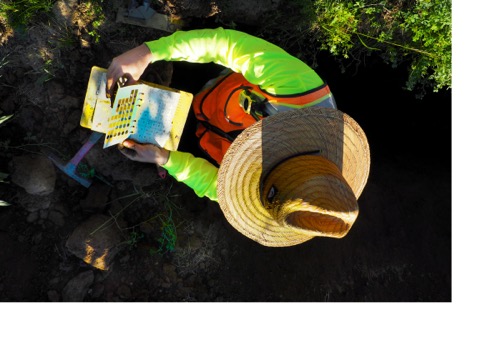The Soul of Soil
It’s the smell. Your nose tells you as much as your eyes. Rich and complex - almost sweet, this is a good spot. You move a few yards and your nose tells you another story - musty and sour. Not a good spot. It seems dirt, like wine, has a bouquet.
May at Troon Vineyard was all about dirt. Moving it, working it, digging it, smelling it and, most of all, marveling at it. Soil is the foundation of everything you do on a farm. It is often said you can make a mediocre wine from a great vineyard, but you can’t make a great wine from a mediocre vineyard. What makes a vineyard great is its soil combined with climate or, as the French call it, terroir. You can’t make bad soil magically good, but you can destroy great soil with commercial, industrial agriculture. We know we have great soils on Oregon’s Kubli Bench due to the already excellent wines we have produced, but the fact-of-the-matter is that these fine soils have been abused by less than enlightened farming practices in the past. I know that if we can bring our soils back to life we can take our already very good wines to even higher levels of quality, in fact, to true greatness. I believe the way to achieve this goal is through the discipline of biodynamics. With soil, you have to put back as least as much as you take out.
We took two major steps forward for our soils and vines this month. The first, which has its own wonderful aromatics, was the construction of our compost pad for production of biodynamic compost. About an acre in size, this pad will eventually hold four compost piles. The first will be the fresh manure and the last will be compost ready for application to our vineyards. The first loads of organic manure were delivered by our neighbors at the Noble Dairy and soon we will be applying the biodynamic preparations (502 to 507) to this pile as we prepare it for application to our vineyard this fall. This is also the area where we will bury the cow horns to prepare our own biodynamic preparation 500 this fall for application next spring. This is a very exciting process for us as we not only rejuvenate our soils, but ourselves.
Our other important step forward with our soils this month was an intensive study of our vineyard by Dr. Paul Anamosa and his Vineyard Soils Technologies team. Using an electro-magnetic study of our vineyard done earlier this year, Dr. Anamosa selected seventy sites where we dug soil pits five feet deep. We spent a fascinating three days with Dr. Nick Madden and Matt Bazzano of Vineyard Soil Technologies and our biodynamic consultant Andrew Beedy as they conducted an exhaustive study analyzing every aspect of the soil in each pit. Each evening soil samples were whisked off to the lab in nightly FedEx shipments. The data we will receive from this study will guide us as we move forward not only in our farming, but in what vine varieties we select and how and where we plant them.
One thing you learn very quickly as you dig hole after hole is that the earth is hiding surprises. You think you can tell good ground by just looking, but that is not always the case. In one spot you find unseen underground water and in another, which you had dismissed, you find gorgeous, sweet smelling gravelly soils. Well-drained sites smell alive and fresh, while poorly drained soils have the musty stink of anaerobic bacteria at work - almost like the aroma of a corked wine. A wine’s bouquet truly comes from the ground up.
Our hole digging days started at 7 a.m. and ended at 7 p.m. in Grants Pass brewpubs. It seems even after twelve hours we could not get enough of talking dirt. Local beer and pizza is a fine ending to a day spent touching the Earth and connecting to people like Andrew, Nick and Matt who have devoted their lives to finding the soul of soil.
At Troon, we are combining the natural, homeopathic methods of biodynamics with state of the art science with only one goal in mind - to make world-class wines in Oregon’s Applegate Valley. To achieve this goal we have to not only search our souls, but the soul of our soils.




